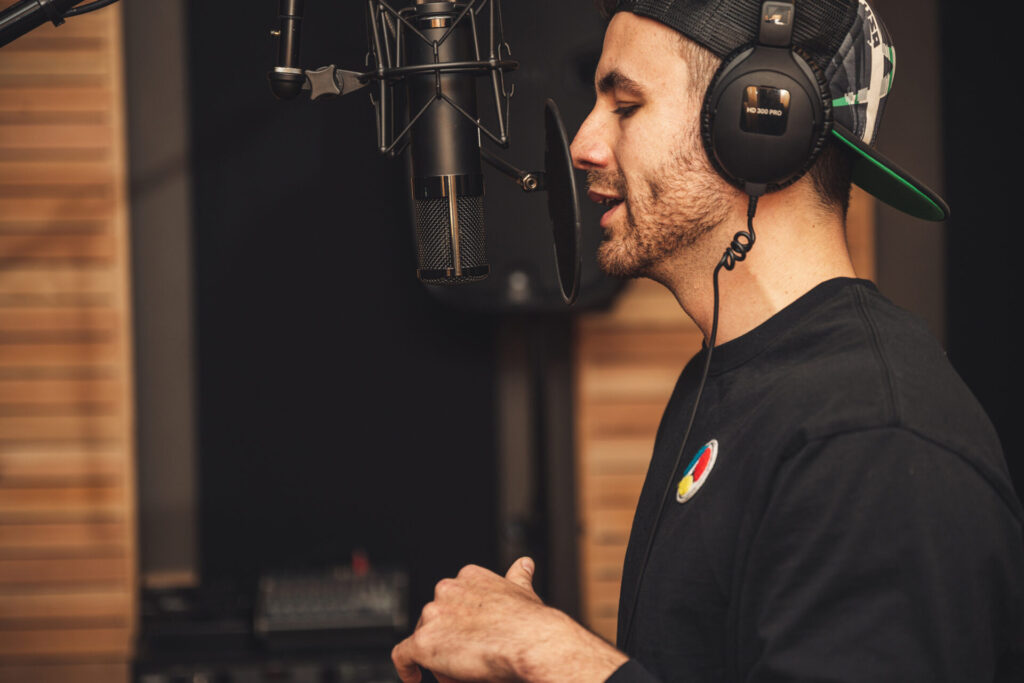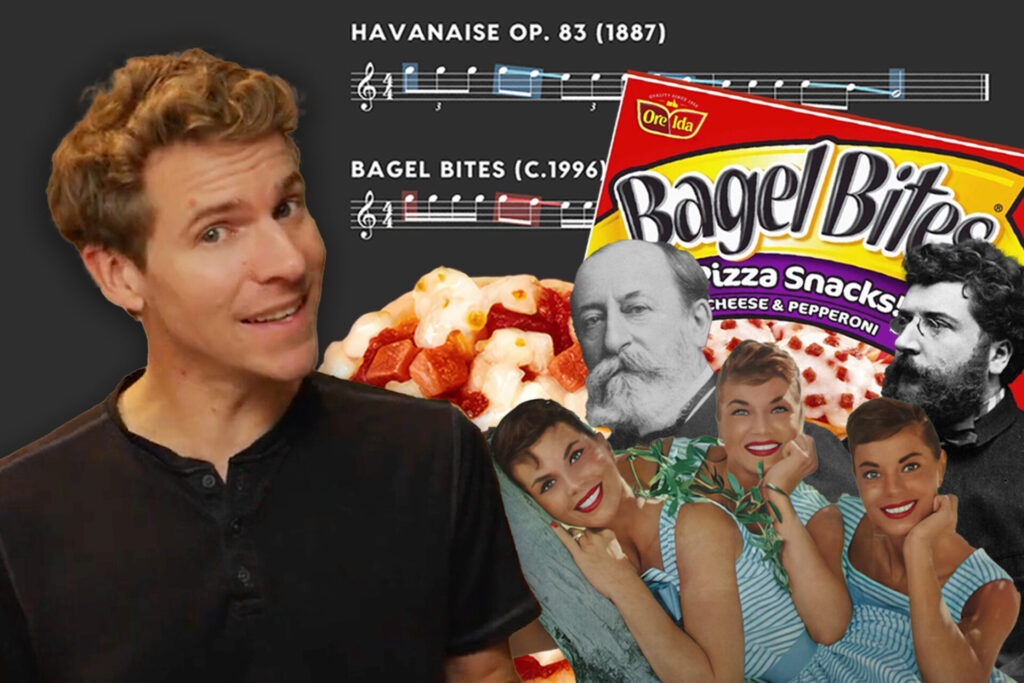(Alberto Ginastera and his cat. Photo courtesy of Slipped Disc.)
The music of South and Central America, for all intents and purposes, is pretty neglected in the North American classical music education system — a mind-boggling notion given not only the geographical proximity, but also the rich body of music that has been and continues to be composed in Latin America.
Studying classical guitar as a child was my first glimpse into this rich and varied world of music. Some of the most exciting guitar music has come out of Latin America, and the repertoire of composers like Heitor Villa-Lobos, Leo Brouwer, Antonio Lauro, and Manuel Ponce has been rightfully welcomed into the classical canon.
These composers however, also wrote volumes of exciting songs, solo, chamber, and orchestral pieces that do not receive the same amount of attention as their guitar music. Not to mention countless other composers who did not compose for the guitar, or composers who worked in styles not generally viewed as legitimate in the classical world.
Below are 14 composers whose legacies in classical music are worth knowing. While I included a short biographical note for each, I could have gone into nearly endless detail on each artist, and, in particular, on the level of political and social involvement most of these artists had in their countries. I encourage you to further investigate this — how Latin American composers’ art is shaped by their political landscape, and how their work has influenced social and political change. And of course, please explore the artistic oeuvres of any composer whose music resonates with you; you’ll be well rewarded.
The following list covers a wide range of styles and countries, and is presented in alphabetical order, not by order of influence. I am sure there are notables left off and some of the female composers included here had to be pulled from more obscurity than their male counterparts on account of the historic global patriarchy.
Oh, and if you’re interested to learn how to compose music, arrange for a string ensemble, or just write more emotionally compelling chord progressions yourself, definitely check out Soundfly’s growing array of online courses.
1. Cacilda Borges Barbosa [Brazil]
Born in 1914 in Rio de Janeiro, died in 2010, Cacilda Borges Barbosa was a Brazilian pianist, conductor, and composer. She played piano in dance halls after completing her education at the National School of Music. She worked with Heitor Villa-Lobos (below) in the 1930s and later became director of the Instituto Villa-Lobos. She was a professor at the National School of Music at the University of Brazil and at the Popular School of Music Education.
2. Leo Brouwer [Cuba]
Born in 1939 in Havana, Leo Brouwer has composed some of the finest guitar music in the repertoire. His early guitar music was very much rooted in Cuban folk music, followed later by more modernist works in the 1980s. Brouwer has also composed several film scores.
3. Matilde Casazola [Bolivia]
Born in 1942 in Sucre, Matilde Casazola Mendoza is one of the most famous Bolivian bards. She has a distinct pseudo-classical guitar style and a folkloric, lilting voice.
4. Alberto Ginastera [Argentina]
Born in 1916 in Buenos Aires, died in 1983, Alberto Evaristo Ginastera studied briefly with Aaron Copland at Tanglewood and was a teacher of Astor Piazzolla’s (below). Ginastera incorporated traditional Argentine musical elements into his own compositions in varying degrees of abstraction throughout his career.
5. Mozart Camargo Guarnieri [Brazil]
Born in 1907 in Sao Paulo, and died in 1993, he was named Mozart Guarnieri at birth but felt that his first name was too bourgeoise for his environs growing up, so he took his mother’s maiden name Camargo and most went by M. Camargo Guarnieri professionally. His brothers are also both named after composers, Rossine (for Rossini) and Verdi. Guarnieri composed a number of symphonies, operas, concertos, sonatas and piano studies between the early 1940s and late 1980s, which helped to define the expanded musical language of a third wave of Brazilian heritage composers after Braga and Villa-Lobos. His orchestral music is as deeply expressive as his pieces for solo piano or violin duo, and was appreciated publicly by Aaron Copland. Guarnieri was one of the founders of the Brazilian Academy of Music and a director of OSUSP, the Symphonic Orchestra of University of São Paulo, and right before he died he was awarded the title of “Greatest Contemporary Composer of the Three Americas”, offered by OEA in Washington.
6. Antônio Carlos Jobim [Brazil]
Born in 1927 in Rio de Janeiro, died in 1994, Antônio Carlos “Tom” Jobim is largely known for the development of bossa nova music through his original songs, but he was a formidable composer and arranger in his own right. His album Matita Pere begins as a group of beautifully arranged bossa songs before descending into a full-blown orchestral wonderland!
7. Eunice Katunda [Brazil]
Born in 1915 also in Rio de Janeiro, died in 1991, Eunice do Monte Lima Katunda was a pianist, musicologist, and composer. She worked as a classical concert pianist and studied Brazilian folk music, and eventually taught musicology at University of Brasilia and composition at Rio de Janeiro Conservatory.
8. Antonio Lauro [Venezuela]
Born in 1917 in Ciudad Bolívar, died in 1986, Antonio Lauro is another titan of 20th century guitar music. Lauro was a fervent cultural nationalist and advocate of Venezuelan waltzes. He was also imprisoned briefly in 1951 by the military junta of Jimenez.
9. Jacqueline Nova [Colombia]
Born in 1935 in Ghent, Belgium, died in 1975, Jacqueline Nova Sondag’s family later emigrated to Colombia where she was raised. She received a scholarship to study composition in Buenos Aires where she worked with notable composers such as Luigi Nono and Alberto Ginastera. She was an avant-garde composer of electronic and electro-acoustic music and an outspoken advocate for modern music being composed in Latin America.
10. Astor Piazzolla [Argentina]
Born in 1921 in Mar Del Plata, died in 1992, Astor Pantaleón Piazzolla and his parents moved to Greenwich Village when he was a boy. He famously discovered tango music through his father’s record collection and began playing a bandoneon (an accordion-like concertina) that his father picked up in a pawn shop. When Piazzolla moved back to Argentina in the 1930s, he began playing bandoneon in tango bands as well as studying classical composition and orchestration. He studied with Ginastera in Buenos Aires and later Nadia Boulanger in Paris and is noted for having revolutionized tango music with his development of “Nuevo Tango.”
11. Manuel Ponce [Mexico]
Born in 1882 in Fresnillo, died in 1948, Manuel María Ponce Cuéllar was a composer, teacher, and scholar of Mexican folk music. He made rich contributions to the classical guitar repertoire and was one of the preferred composers of Spanish guitar legend Andres Segovia. He also composed a large number of original songs and arrangements of Mexican folk songs.
12. Baden Powell [Brazil]
Born in 1937 in Rio de Janeiro, died in 2000, Baden Powell de Aquino was a virtuosic guitarist and composer. He worked on many bossa nova and Brazilian jazz records but rarely shied away from the nylon string (classical) guitar. This created a unique mix of Brazilian style, jazz harmony, and classical technique in his playing and composing.
13. Silvestre Revueltas [Mexico]
Born in 1899 in Santiago Papasquiaro, died in 1940, Silvestre Revueltas Sánchez was a composer of songs, film, chamber, and orchestral music. In 1937, he went to Spain during the Spanish Civil War as part of a tour organized by the League of Revolutionary Writers and Artists and returned to Mexico City after Franco’s victory. “Sensemaya” (above) is considered by many to be his masterpiece.
14. Heitor Villa-Lobos [Brazil]
Born in 1887 in Rio de Janeiro, died in 1959, Heitor Villa-Lobos is arguably the most well known and performed Latin American composer. He is yet another titan of guitar music in the 20th century: His Preludes and Études hold high esteem in the repertoire and have become a staple for every classical guitarist. He also composed fantastic music for woodwinds as well as large-scale orchestral works. Villa-Lobos was an advocate for the study and use of Brazilian folk music as foundation for a national classical music of Brazil.
Have you checked out Soundfly’s courses yet?
Continue your learning with hundreds of lessons by boundary-pushing, independent artists like Kimbra, Ryan Lott & Ian Chang (of Son Lux), Jlin, Elijah Fox, Kiefer, Com Truise, The Pocket Queen, and RJD2. And don’t forget to try out our intro course on Scoring for Film & TV.




